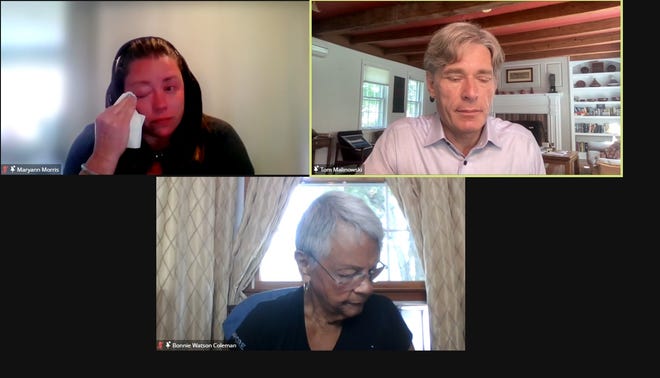By Ashley Balcerzak
The insurance payout and a government loan were nowhere near close to what Maryann Morris needed to repair her Manville home, which was inundated with 3 feet of murky water from the remnants of Hurricane Ida a year ago.
Morris has $16,000 left from her insurance award to cover a bill of $135,000 to pay her contractor, whose repairs included installing new insulation and drywall. Morris and her 8-year-old daughter are still not back in their Somerset County house — they are renting an apartment in Bridgewater while repairs are being made — and she fears she’ll lose the home to foreclosure without help.
“I just have no idea where we stand or what we’re going to do,” Morris said Wednesday. “I’m worried that I’m going to have to tell my daughter that we have to leave New Jersey and that she’ll lose her friends, school and home.”
Survivors and advocates shared their traumatic stories of Ida — a storm that killed at least 30 New Jerseyans and displaced thousands — during an online event Wednesday organized by the grassroots group New Jersey Organizing Project and attended by Democratic Reps. Tom Malinowski and Bonnie Watson Coleman.

Advocates called on Congress to make changes to improve the process for those recovering from a natural disaster, such as making the current Community Development Block Grant a permanent program that disperses help immediately, instead of a pot that requires congressional action each time a disaster strikes.
The federal government awarded opens in a new windowNew Jersey $228 million in CDBG funds and the state is devising a plan for how to spend the money. New Jersey does not expect flood survivors to receive assistance through the program until 2023, more than a year and a half after Ida struck.
“There’s a lot of work that needs to be done, figuring out how to get financial relief more quickly,” said Watson Coleman. “FEMA also doesn’t do a good enough job determining the value of property and the cost to restore.”
New Jerseyans opens in a new window can fill out an online survey or opens in a new windowattend in-person hearings to tell the state how they think the funds should be spent.
opens in a new windowThe Department of Community Affairs is proposing to spend $152 million for housing programs to restore homes and pay for rental costs, provide zero-interest forgivable loans for renters, buy out properties in flood prone areas and subsidize affordable housing development in lower flood risk areas. Another $58 million could go to infrastructure programs to protect communities against natural hazards.
Hearings will be held on Sept. 8 from 6 p.m. to 8 p.m. in the auditorium of Manville High School, 1100 Brooks Blvd., and on Sept. 12 from 6 p.m. to 8 p.m. at the New Jersey Institute of Technology’s Campus Center Ballroom, 150 Bleeker St., Newark.
A day of joy turned to terror
What started as a joyful and exciting day for Leanna Jones — it was the first day of school for her children — ended with the fire department rescuing her from the side of the road in Milford, Hunterdon County, as 6 feet of water filled her basement and first floor.
They moved into Jones’ parents house while the fire department pumped out the water and repairs were made. The floors had to be ripped out, electrical and heating replaced. Precious photos and memories were lost.
“I’m still waiting for insurance to release some of the funds that I’m covered for [and] that’s delayed me with FEMA and SBA,” Jones said. “It also means that one year after the disaster, I am weighing whether I would end up back at a food bank, how to feed my kids. The lack of a disaster aid recovery system has left me feeling like I must have done something wrong.”
Malinowski said flood survivors should contact their member of Congress, who may be able to help guide them through the bureaucracy and fight assistance awards if they are too low.
“Bureaucracies tend to answer our phone calls faster than they do yours,” Malinowski said. “Oftentimes we can get a yes when the answer might otherwise have been a no, so it’s always worth a try.”
